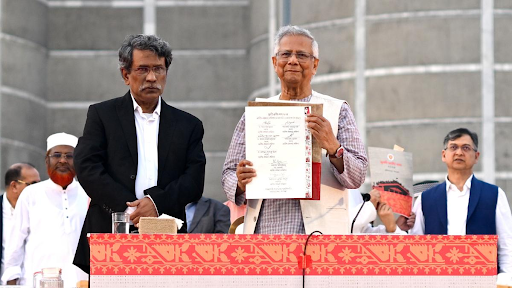



The July Charter aims to create a "New Bangladesh" free from discrimination and authoritarianism after a student uprising. Key goals include constitutional and judicial reforms, repealing oppressive laws, and establishing a democratic, accountable government for national stability.

Copyright infringement not intended
Picture Courtesy: THEHINDU
Bangladesh adopted the "July National Charter," a political reform initiative by Nobel laureate Dr. Muhammad Yunus.
|
Read all about: India-Bangladesh Cooperation |
The July Charter (also referred to as the July Declaration) is a political accord and a proposed constitutional document designed to reshape Bangladesh's system of governance.
It aims to grant official recognition to the 2024 student-led uprising and chart a roadmap for a more democratic, accountable, and inclusive state, often referred to as the "Second Republic."
Charter's origins lie in the mass protests that erupted in July 2024.
The charter was drafted by a National Consensus Commission, established by Dr. Yunus. Its core objectives are:
The charter outlines over 80 reform proposals and a seven-point implementation commitment, with key proposals including:
Boycott by Student Leaders (NCP)
The NCP, formed by July Uprising student leaders and initially backed by Dr. Yunus, rejected the charter, noting lack of "legal basis".
Exclusion of the Awami League
The Awami League, the former ruling party, was excluded from consensus talks after the interim government disbanded its activities and jailed or exiled its leaders, threatening the charter's national acceptance and sustainability.
The July Charter, despite broad support, faces challenges from student boycotts and a key party's exclusion, impacting its goal to reform Bangladesh's politics post-uprising. Its ratification via referendum or parliament is vital for long-term reform.
Source: THEHINDU
|
PRACTICE QUESTION Q. Which of the following statements regarding the July Charter of Bangladesh is/are correct?
Which of the above statements is/are correct? A) 1 only B) 2 only C) Both 1 and 2 D) Neither 1 nor 2 Answer: A Explanation: Statement 1 is correct: The July Charter emerged from Bangladesh's 2024 mass protests and regime change, aiming to establish democratic, transparent, and fair governance through constitutional, electoral, and administrative reforms. Statement 2 is incorrect: Anti-government protests, led by students against job quotas, led to Prime Minister Sheikh Hasina's resignation and the formation of an interim government under Muhammad Yunus. |
The July Charter is a political declaration that emerged from the July-August 2024 mass protests in Bangladesh. It details a plan for constitutional, electoral, and administrative reforms and represents an agreement between political parties and the interim government after the previous government's removal.
The July Charter proposes over 80 governance reforms, including strengthening checks and balances between branches of government, electoral, judicial, public administration, and anti-corruption reforms, a two-term limit for prime ministers, and expanded presidential powers.




© 2026 iasgyan. All right reserved